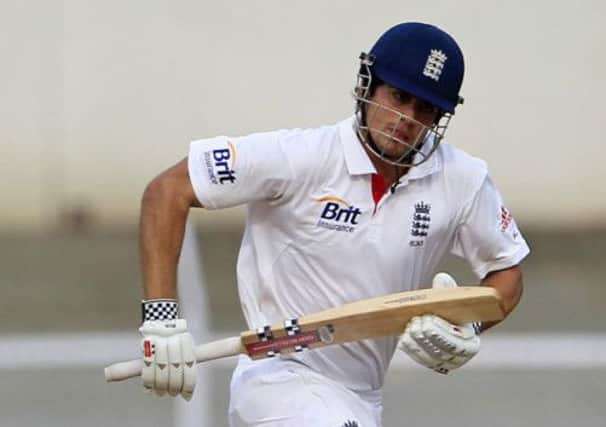Cook is proof that it’s not how, it’s how many


He is remarkable precisely for the reason he is so unremarkable.
Cook’s figures suggest he is one of the most remarkable players of the modern era.
Advertisement
Hide AdAdvertisement
Hide AdYet in every other aspect he is quite unremarkable, which is the most remarkable thing, if you get my drift.
To put it another way, there is nothing about Cook that is particularly memorable.
Possibly unique among leading batsmen, his innings tend to wash over the viewer, as though they were the equivalent of a party political broadcast.
No sooner have they been played than they are speedily forgotten, like the pre-election promises of the average MP.
Advertisement
Hide AdAdvertisement
Hide AdAll that remain are the wondrous figures, the class, the consistency, the rat-a-tat-tat of three-figure scores.
Should Cook hit another hundred in the second Test against New Zealand in Wellington that starts tonight, it would be his fifth in six games since replacing Andrew Strauss as captain.
It would be his seventh in eight Tests overall as leader and take him above the great Vivian Richards’s total of Test match centuries.
Cook’s 116 in the second innings of the drawn first Test in Dunedin, where England were unexpectedly outplayed by the home team, was his 24th Test hundred, two more than any other Englishman.
Advertisement
Hide AdAdvertisement
Hide AdThe 28 year-old, on whom much may depend if England are to win in Wellington and in the final Test in Auckland, has amassed 7,243 Test runs at 49.60; it is frightening to think just how many he might end up with.
Barring natural disaster, Cook will soon soar past the England record of 8,900 Test runs by Graham Gooch, his mentor.
When Cook recently eclipsed the English record of 22 Test centuries, previously shared with Wally Hammond, Geoffrey Boycott, Colin Cowdrey and Kevin Pietersen, Gooch acknowledged as much and said Cook’s best days were still ahead of him.
“In my opinion, the years between 27 to 35 are the best years for a batsman,” said Gooch, the former Essex and England opener and current England batting coach.
Advertisement
Hide AdAdvertisement
Hide Ad“At that age, you have honed your knowledge and you know your game.
“I think Alastair’s got his best years in front of him.
“He’s got to stay fit and motivated, but nothing at the moment would suggest to me that that won’t happen.”
While praising Cook, who became the youngest batsman to pass 7,000 Test runs on the pre-Christmas tour to India, Gooch also conceded that his protege has never been the most eye-catching player.
When one thinks of a random Cook innings, it can actually be quite difficult to remember much about it.
Advertisement
Hide AdAdvertisement
Hide AdFor example, the record books show that he scored 190 against India in Kolkata just three months ago.
And yet I, for one, cannot recall a single thing about that innings, even though I watched it on television.
Nothing, that is, apart from the bizarre way in which Cook was dismissed; he was run-out for failing to ground his bat while trying to avoid a throw to the non-striker’s end.
Often, it is difficult to recall even a single shot that Cook has played on any given day, save for some vague recollection of an elegant cover drive here or nurdle to leg there.
Advertisement
Hide AdAdvertisement
Hide AdHe is one of those batsmen whose total seems to rise as if by magic; one minute you look up at the scoreboard to find that he has suddenly gone to 50 from 90 balls with seven fours.
Cook’s public pronouncements are not dissimilar to most of his innings.
He can talk politely and perfectly well and yet leave the listener struggling to recall a single sentence.
Rather, the impression left is of innate seriousness and commonsense, a man who has no time for idle frippery.
Advertisement
Hide AdAdvertisement
Hide AdCook is no showman, but he is a cricketer of considerable substance.
His secret as a batsman essentially boils down to knowing his limitations and playing within them.
As Gooch observed: “The priceless ability Alastair had when he was young, and again you can see this now, is that he knows exactly what he can and can’t do.
“He puts that in place and into practice and doesn’t step outside that.
Advertisement
Hide AdAdvertisement
Hide Ad“You know the old saying, ‘it’s not how, it’s how many’, and he knows the way to play.
“Often, young players coming up have talent and ability to strike the ball, but they don’t quite know how to manage their ability.”
Not so Cook, who knows how to manage not only himself but also those around him.
Despite England’s stuttering start to the first Test in Dunedin, where they were perhaps guilty of complacency as well as a lack of proper preparation, Cook has thus far done a splendid job of replacing Strauss.
Advertisement
Hide AdAdvertisement
Hide AdThe captaincy has had a positive effect on his batting too, and his remarkable rise is perhaps best measured by the fact that of the other nine Englishmen to have passed 7,000 Test runs – Messrs Gooch, Alec Stewart, David Gower, Boycott, Michael Atherton, Colin Cowdrey, Pietersen, Hammond and Strauss – only Hammond (58.45) has a superior average.
For a man as ostensibly unremarkable as Alastair Cook, that is a truly remarkable statistic.